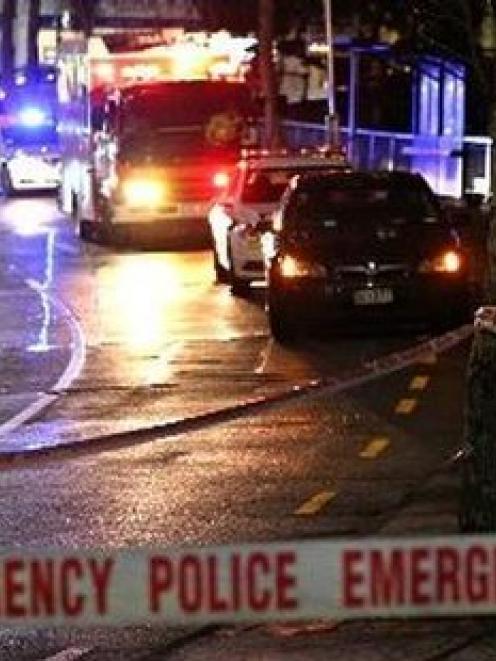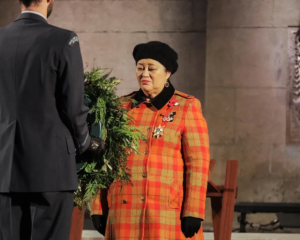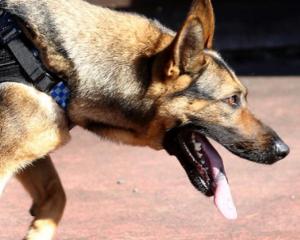
His father died when he was young and his family didn't have the money to send him to the United States as an exchange student, but he made it as far as Australia and then New Zealand under his own steam.
No one in the Auckland fighting scene had heard of him yet, but he was finding his feet as an apprentice for a roofing and plumbing company on his 12-month working visa.
But it all ended in Myers Park on Sunday night, the 21-year-old calling 111 after he was named by police as a suspect in three aggravated robberies on the North Shore.
The first was on a Sunday night, the week before the fatal shooting, when he allegedly held up the Harbour City liquor store in Glenfield.
Duty manager Jung Kun Ahn said the robber spoke with a "Russian" accent and appeared calm as he demanded cash with a large knife. "It seemed like he had done this before."
A few days later, police suspect Cerven struck again at the Thirsty Liquor store.
"I opened the till slowly, hoping for someone to come in as it is usually a busy time," owner Deborah Wang said. "But I think I was too slow so he started to grab the cash himself."
He ran off with about $400.
But it was not until Saturday night when Cerven allegedly robbed a dairy in East Coast Rd that detectives from the Waitemata CIB found a clue to his identity.
Cerven had "left evidence" at the scene and police put out a press release the following day, publishing his name and image in the hope that someone would recognise him.
A little over six hours later, he gave himself up. Cerven called 111 at 7.23 on Sunday night to say he was in Myers Park and wanted by police for the aggravated robbery.
Some have speculated that Cerven had a death wish, that he wanted to be shot by police in a "suicide by cop" scenario.
But all Superintendent Richard Chambers, Auckland's top policeman, would say is Cerven insisted that police come to the park, rather than walk a few hundred metres to the nearest police station.
"When he was located he told the officers who engaged with him verbally from a distance that he was armed," said Mr Chambers at a press conference yesterday morning.
"Consequently, unarmed staff retreated and requested armed officers to attend."
The New Zealand Herald understands that two armed officers then approached Cerven and believed he was carrying a firearm.
"They have both assessed the situation as an immediate fatal threat and discharged their weapons around the same time," a well-placed source said.
Police have not confirmed whether a weapon was found, or how many rounds were fired by the pair.
A post-mortem examination has since been completed and the results could be released as soon as today, confirming how many bullets struck him.
CCTV tapes key evidence
The entire episode was recorded on CCTV and the tapes will be the key evidence for three inquiries into his death: two conducted by the police - homicide and internal procedures - and a third by the Independent Police Conduct Authority.
ESR scientists, a specialist search team and CIB staff spent all yesterday in Myers Park, which was still cordoned off last night.
Metal detectors were used to search for evidence, possibly bullet casings, and yellow markers laid down where electronic beeps were heard.
The main search area is about 15 metres down a small hill where a white tent is standing where Cerven fell.
As for what triggered Cerven's alleged activities leading to his death, his colleagues at Topline Trade Services and his travelling companions declined to comment.
"They are all upset as you can imagine," honorary Slovak consul Peter Kiely said after meeting Cerven's friends yesterday. "What happened and why is very unclear. It is a police investigation and the police are endeavouring to work out what happened."
Superintendent Richard Chambers said staff on Operation Delaware were working hard to find witnesses and speak to Cerven's family in Slovakia.
"However, it will be some time before we will be in a position to discuss what answers our inquiries today may have provided to the myriad questions."
Break-up with girlfiend
A former workmate says Cerven was "distraught" after the recent break-up of a two-year relationship with his Slovakian girlfriend.
Waterproofer Richard Glover said Cerven claimed he needed money to repay a loan for surgery from an injury sustained as a sniper in Iraq.
"He was distraught about his life, he said it was hell, but he seemed like a 'get up and keep going' kind of guy."
Mr Glover said he worked alongside Cerven, who claimed to have been shot in the knee about nine months after being deployed to Iraq. He borrowed money to pay for surgery, which he had before coming to New Zealand.
Cerven walked with a limp as a result of the injury, and had two scars around his kneecap.
"He was a nice guy," Mr Glover said. "We got kind of close. He shared a lot with me and I felt sorry for the dude."
Mr Glover said Cerven had lived in New Zealand since March this year with his girlfriend of two years, but they broke up a few weeks ago.
Fifteen years, 12 deaths
David Cerven's death was the 12th fatal police shooting in the past 15 years. Here are the others.
May 3, 2015: Vaughan William John Te Moananui, 33, shot after he refused to surrender to police, and pulled out a gun in Thames. He was taken to hospital but died shortly afterwards.
July 7, 2013: Caleb Henry, 20, shot on Auckland's Northern Motorway after committing home invasion in Opotiki. Officers chased him from Cambridge and eventually stopped him with road spikes. He was pointing his gun at officers when a member of the Armed Offenders Squad shot him.
June 8, 2013: Adam Te Rata Charles Morehu, 33, shot and killed after shots fired at police at New Plymouth Golf Club. The IPCA later said poor communication and a lack of command and control contributed to the events that unfolded.
July 15, 2011: Anthony Ratahi, 46, shot and killed as he struggled with police dog after a siege in Opunake, 65km south of New Plymouth. He had been holding ex-partner Marcelle Beer hostage at the Headlands Hotel for 12 hours.
March 28, 2011: Lachan Kelly-Tumarae, 19, shot four times by an officer after a police chase in Omahu, near Hastings. Kelly-Tumarae was killed after he stopped his car and pointed a gun at officers.
June 28, 2009: Shayne Sime, 42, shot dead by police after two-hour standoff in Christchurch which left officer and neighbour injured. Mr Sime's death was ruled a suicide.
January 23, 2009: Halatau Naitoko, 17 - an innocent bystander - shot dead by police on Auckland's Northwestern Motorway after getting caught in crossfire as police shot at aggravated robber Stephen Hohepa McDonald, 50.
October 23, 2008: Lee Jane Mettam, 37, fatally shot by member of Armed Offenders Squad after she threatened to kill staff of a Vodafone store in Whangarei.
September 26, 2007: Stephen Bellingham, 37, shot dead by policeman in Christchurch after smashing cars and car windows with a claw hammer. Said to have been on a party-pill binge.
August 14, 2004: Haidar Ebbadi Mahdi, 37, died from bullet to head as he stabbed wife being held in headlock in South Auckland house.
April 30, 2000: Steven Wallace, 23, of Waitara, shot after window-smashing spree in the town.












